Big Red Business: No football: Dark days ahead for businesses
Mike Osborne looks forward to football weekends in Lincoln for more reasons than just being the son of legendary former head coach Tom Osborne.
The younger Osborne’s livelihood is tightly tethered to Nebraska sports through his business, Best of Big Red, which sells Nebraska apparel and memorabilia across the street from Memorial Stadium and at a second Lincoln location.
With the Big Ten’s decision on Tuesday to cancel football, women’s volleyball and all other fall sports, Osborne is scrambling to readjust his business plans for the rest of this year.
“Seventy percent of our annual revenue comes during football season (and) of that I’d attribute about one-tenth to volleyball,” Osborne said. “Home games in particular are big with nearly 25 percent of our annual gross revenue coming from Friday’s and Saturday’s of the usual seven home games.”
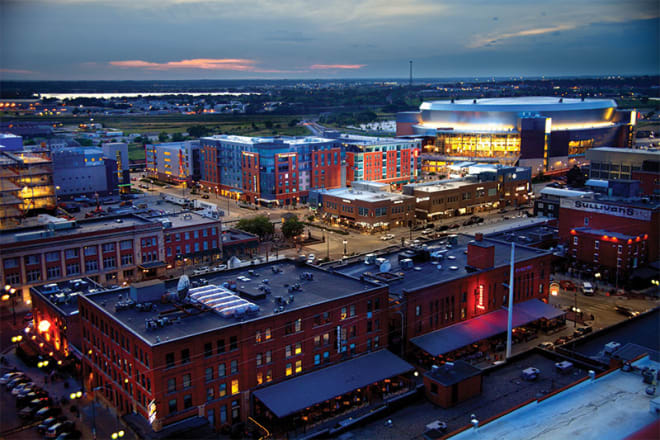
Osborne has held off hiring the normal amount of extra staff for this fall. While he said full-time staff will be fine, current part-timers may be reduced. As for new merchandise lines for the 2020 season, they’re already here.
“We will likely focus heavily on trying to sell the 2020 Husker merchandise as best we can using social media and emails and through our website,” Osborne said. “We also have all the game and highlight videos dating back to 1992 and quite a few before that too. We will likely strive to get them viewable online if there is no season at all. We’ve never had time to do that.”
In the big picture, no football this fall will lead to major financial challenges for businesses, the university and the athletic department in this college town.
The University of Nebraska Bureau of Business Research in 2014 studied the economic impact Nebraska athletics had on the local economy. Seven football weekends for the 2013-2014 fiscal year generated more than $42.9 million for Lincoln merchants, or about $6 million per game. In today’s dollars, that amounts to about $47 million per season after adjusted for inflation.
Statewide, the research bureau reported the annual economic impact from football was more than $200 million, including $2.34 million in much-needed sales tax revenue to support the state budget. Football generated 1,890 jobs that year, the study showed.
But the financial fallout from pulling the plug on football cannot be measured solely by a set of numbers on a spreadsheet. The economic impact in Lincoln and the entire state of Nebraska for that matter will be felt in a distinctly micro level as well -- from business owners, to the part-time workers who man concession stands on game days, and Uber drivers who work on home game weekends.
“The governor, the mayor (of Lincoln), the athletic department and coach Frost get the economics of what this means” to lose football, women’s volleyball and the other sports, said Bryan Sullivan, general manager of the Embassy Suites hotel in downtown Lincoln.
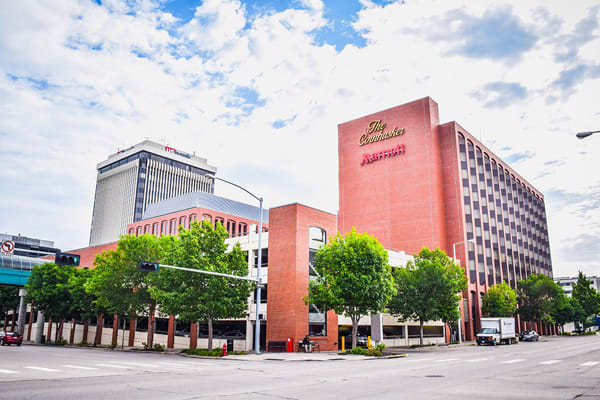
Feeling whipsawed
Businesses in college towns like Lincoln bank on seven or more home football weekends for the huge influx of fans who spend money on hotels, restaurants, bars, souvenir shops, gasoline and even game-day parking in someone’s front yard.
In a matter of days, business owners and workers alike went from a sense of hope when the conference rolled out the revised football schedule to despair following Tuesday’s cancellation announcement.
Sullivan was among those riding the emotional roller-coaster.
“Everybody is really confused,” he said.
Shortly after the conference-only fall football schedule was released, the phone started ringing off the hook at the Embassy Suites from people looking to book rooms, said Sullivan.
Coming off a rough five months since the coronavirus hit the United States, Sullivan said news of the revamped football schedule “gave us something to look forward to. It was a bright point from an attitude perspective.”
Sullivan said plans were in the works for home football game lunch parties and other entertainment to welcome back fans.
With football and other bookings cancelled, business at the Embassy is “easily 50 percent down from the end of of 2019. Occupancy at the 252-room hotel is about 45 percent as of now, but on the bright side, Sullivan is forecasting about five percent growth each month through the end of the year.
He did not build football-related business into his latest forecast.
Several Lincoln-area hotels shut down as the coronavirus situation worsened, but all reopened in July except the Lincoln Marriott Cornhusker. It is set to open next week, said Jeff Maul, executive director of the Lincoln Convention and Visitors Bureau.
“We’re furloughed till fall” was the response Maul has heard from countless hospitality industry workers. Furloughs might last longer now, especially if companies continue to struggle.
If there’s a silver lining, Maul said, it’s that many have found ways to ride out the storm. Indeed, hotels, restaurants and bars should get a boost on Aug. 21 when nearly 3,000 people are scheduled to attend the USA BMX Cornhusker Nationals. Maul said 800 bikers have registered for the three-day event.
He and his marketing team met Wednesday morning to discuss ideas on how to generate more business in the city in coming months.
Meanwhile, the new 155-room hotel under construction near the Innovation Campus has not experienced any delays because of the pandemic, said Ashley Solt, director of development with Goldenrod Companies. “We’re still on track” for a July 2021 opening, she said.
An official groundbreaking for the $35 million project, which at one time was to be held in mid-March, is now set for Aug. 18 at 8:30 a.m., and the name of the Marriott-affiliated hotel will be revealed at that time, Solt said.
The hotel, featuring a full-service restaurant and rooftop bar, is being built near the intersection of 21st Street and Transformation Drive and is adjacent to the Rise Building and close to the Devaney Center and future Nebraska outdoor track stadium.
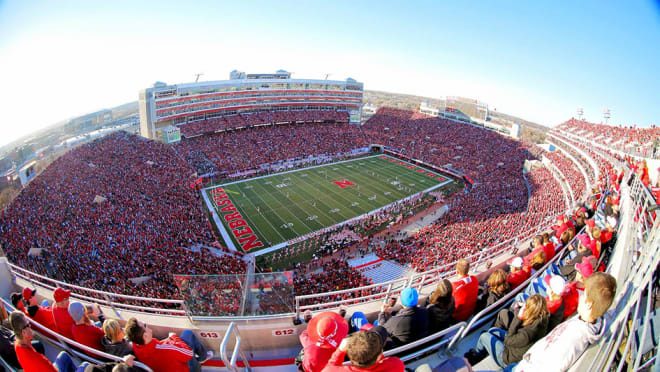
Weathering the storm
Randy Farwell, owner of the online retailer CornBorn, said he is expecting a challenging third quarter after experiencing a “normal” first half of this year.
“We’ll miss out on the fans buying new gear specifically to have something new to wear to games or watch parties,” Farwell said.
On the other hand, he said, he is “still confident that fourth-quarter holiday volume could make up for any third-quarter shortfall. Shoppers will probably still want to avoid shopping in crowded brick and mortar stores and that should benefit smaller local online shops like CornBorn.”
Farwell said he’s planning an “aggressive advertising budget” during the fourth quarter that will highlight CornBorn’s special designs.
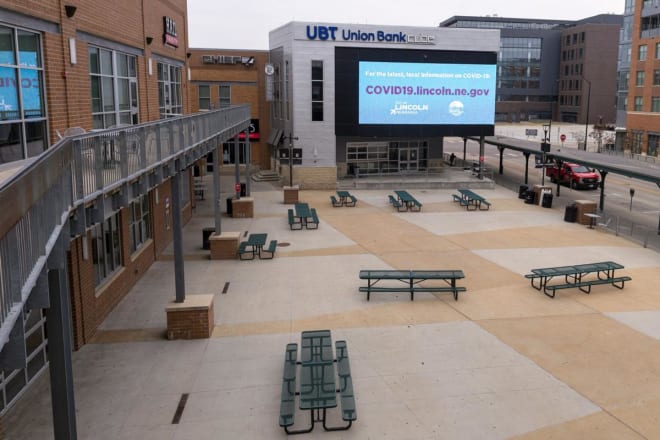
No tickets
Chad Carr started preparing both mentally and financially in April for the likelihood of no college sports this fall.
As the owner of Omaha-based Ticket Express, Carr derives a significant amount of revenue through the sale of college football tickets, especially Nebraska tickets. He has little product to push.
“We really didn’t feel there’d be a season in front of fans,” Carr said. “But when the news broke (Tuesday), it became a reality.”
While business is down 90 percent compared to this time last year, Carr said his company “has enough money to weather the storm.” He is focusing on helping Ticket Express customers get their money refunded as quickly as possible.
He is not counting on the Cornhusker football team cobbling together a schedule to play this fall or even next spring.
“There just are a lot of people and businesses that are hurting,” such as bars, restaurants and entertainment venues, Carr said. “As an entrepreneur, I have a lot of sympathy for businesses that are struggling. These are pretty dark days.”
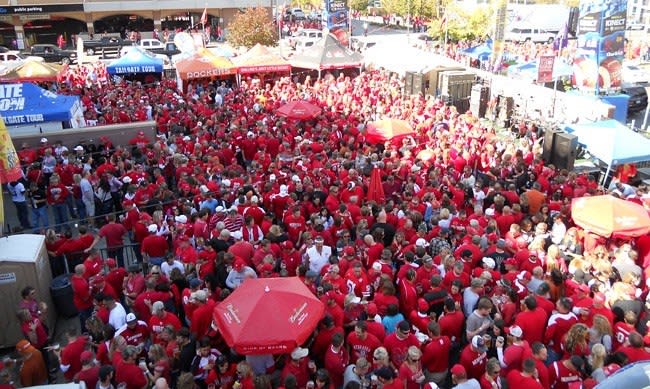
Substitution, crowing out, leakage?
Victor Matheson is a professor of economics and accounting -- with expertise in the economics of sports -- at the College of Holy Cross in Massachusetts. He and his research partners have done two studies about the economic impact of college athletics and the local college town.
In the first study, Matheson found the numbers that visitor and tourism bureaus share about the financial impact of college sports on college itowns are likely inflated. “We could not detect any measurable impact,” Matheson said Wednesday.
The second report looked at even more detailed data, and determined that local economies got about a $2 million boost in spending on game day weekends. With a typical schedule of seven home games, that’s a $14 million bump.
Matheson said there are three reasons why the spending isn’t higher -- what he called the substitution effect, crowding out, and leakage.
In sports economics, the substitution effect means that people are shifting around how they spend their money. Rather than going to the movies, they are taking in a college football game.
Regarding the crowding out effect, the economic activity associated with the game crowds out other activity that normally happens. When there’s a football game in Lincoln, everything shuts down except for the football game.
“I grew up in Boulder and attended the University of Colorado,” Matheson said. “When Colorado football is playing, you don’t go to the shopping mall that day, you don’t go downtown...It’s stopping other sorts of activity that normally would be occurring.”
The third reason: While money gets spent in Lincoln on home game weekends, much of it doesn’t stay in Lincoln, he said. “Unless the hotel is locally owned, much of the money for hotel rooms goes back to corporate headquarters,” he said. Typically, 50 cents of every dollar fans spend at football games and other mega events ends up elsewhere, Matheson said.
Biut Matheson said the impact of canceling Big Ten football will be felt by individual shops and restaurants.
“Just because (the overall impact) is not large doesn’t mean it’s not huge for individual businesses” like bars and restaurants, he said.
One final caveat that’s traced to the pandemic: “Covid-19 has given us no ability to respend the money, so there’s no substitution effect. The same with crowding out. The sort of things that make it look like sports has a pretty modest impact….a bunch of those have disappeared. So the economic impact may be larger.”
Steve Rosen writes about the business of sports for HuskerOnline. Questions, comments, story ideas? Reach Steve at srosen@huskeronline.com